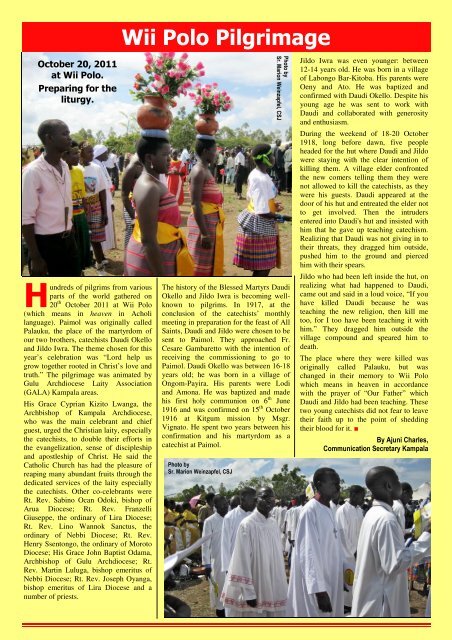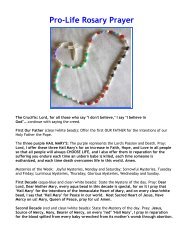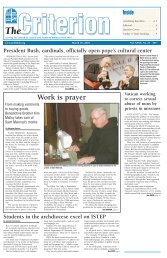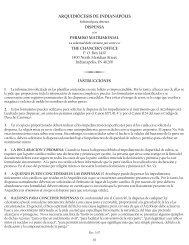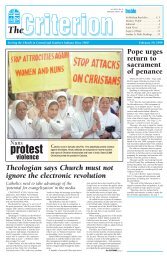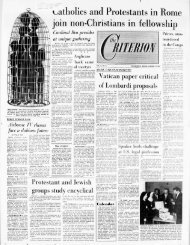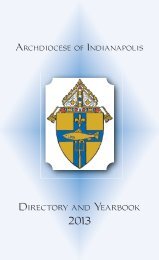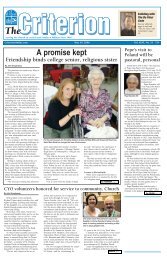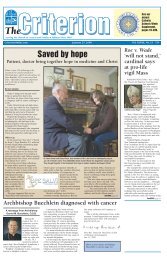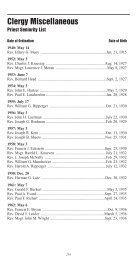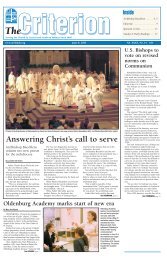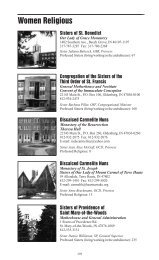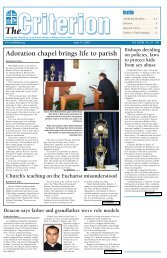Arua Diocese Bulletin -- November/December 2011
Arua Diocese Bulletin -- November/December 2011
Arua Diocese Bulletin -- November/December 2011
You also want an ePaper? Increase the reach of your titles
YUMPU automatically turns print PDFs into web optimized ePapers that Google loves.
October 20, <strong>2011</strong><br />
at Wii Polo.<br />
Preparing for the<br />
liturgy.<br />
H<br />
undreds of pilgrims from various<br />
parts of the world gathered on<br />
20 th October <strong>2011</strong> at Wii Polo<br />
(which means in heaven in Acholi<br />
language). Paimol was originally called<br />
Palauku, the place of the martyrdom of<br />
our two brothers, catechists Daudi Okello<br />
and Jildo Iwra. The theme chosen for this<br />
year’s celebration was “Lord help us<br />
grow together rooted in Christ’s love and<br />
truth.” The pilgrimage was animated by<br />
Gulu Archdiocese Laity Association<br />
(GALA) Kampala areas.<br />
His Grace Cyprian Kizito Lwanga, the<br />
Archbishop of Kampala Archdiocese,<br />
who was the main celebrant and chief<br />
guest, urged the Christian laity, especially<br />
the catechists, to double their efforts in<br />
the evangelization, sense of discipleship<br />
and apostleship of Christ. He said the<br />
Catholic Church has had the pleasure of<br />
reaping many abundant fruits through the<br />
dedicated services of the laity especially<br />
the catechists. Other co-celebrants were<br />
Rt. Rev. Sabino Ocan Odoki, bishop of<br />
<strong>Arua</strong> <strong>Diocese</strong>; Rt. Rev. Franzelli<br />
Giuseppe, the ordinary of Lira <strong>Diocese</strong>;<br />
Rt. Rev. Lino Wannok Sanctus, the<br />
ordinary of Nebbi <strong>Diocese</strong>; Rt. Rev.<br />
Henry Ssentongo, the ordinary of Moroto<br />
<strong>Diocese</strong>; His Grace John Baptist Odama,<br />
Archbishop of Gulu Archdiocese; Rt.<br />
Rev. Martin Luluga, bishop emeritus of<br />
Nebbi <strong>Diocese</strong>; Rt. Rev. Joseph Oyanga,<br />
bishop emeritus of Lira <strong>Diocese</strong> and a<br />
number of priests.<br />
<strong>November</strong> / <strong>December</strong> <strong>2011</strong><br />
Wii Polo Pilgrimage<br />
The history of the Blessed Martyrs Daudi<br />
Okello and Jildo Iwra is becoming wellknown<br />
to pilgrims. In 1917, at the<br />
conclusion of the catechists’ monthly<br />
meeting in preparation for the feast of All<br />
Saints, Daudi and Jildo were chosen to be<br />
sent to Paimol. They approached Fr.<br />
Cesare Gambaretto with the intention of<br />
receiving the commissioning to go to<br />
Paimol. Daudi Okello was between 16-18<br />
years old; he was born in a village of<br />
Ongom-Payira. His parents were Lodi<br />
and Amona. He was baptized and made<br />
his first holy communion on 6 th June<br />
1916 and was confirmed on 15 th October<br />
1916 at Kitgum mission by Msgr.<br />
Vignato. He spent two years between his<br />
confirmation and his martyrdom as a<br />
catechist at Paimol.<br />
Photo by<br />
Sr. Marion Weinzapfel, CSJ<br />
Photo by<br />
Sr. Marion Weinzapfel, CSJ<br />
Jildo Iwra was even younger: between<br />
12-14 years old. He was born in a village<br />
of Labongo Bar-Kitoba. His parents were<br />
Oeny and Ato. He was baptized and<br />
confirmed with Daudi Okello. Despite his<br />
young age he was sent to work with<br />
Daudi and collaborated with generosity<br />
and enthusiasm.<br />
During the weekend of 18-20 October<br />
1918, long before dawn, five people<br />
headed for the hut where Daudi and Jildo<br />
were staying with the clear intention of<br />
killing them. A village elder confronted<br />
the new comers telling them they were<br />
not allowed to kill the catechists, as they<br />
were his guests. Daudi appeared at the<br />
door of his hut and entreated the elder not<br />
to get involved. Then the intruders<br />
entered into Daudi's hut and insisted with<br />
him that he gave up teaching catechism.<br />
Realizing that Daudi was not giving in to<br />
their threats, they dragged him outside,<br />
pushed him to the ground and pierced<br />
him with their spears.<br />
Jildo who had been left inside the hut, on<br />
realizing what had happened to Daudi,<br />
came out and said in a loud voice, “If you<br />
have killed Daudi because he was<br />
teaching the new religion, then kill me<br />
too, for I too have been teaching it with<br />
him.” They dragged him outside the<br />
village compound and speared him to<br />
death.<br />
The place where they were killed was<br />
originally called Palauku, but was<br />
changed in their memory to Wii Polo<br />
which means in heaven in accordance<br />
with the prayer of “Our Father” which<br />
Daudi and Jildo had been teaching. These<br />
two young catechists did not fear to leave<br />
their faith up to the point of shedding<br />
their blood for it. ■<br />
By Ajuni Charles,<br />
Communication Secretary Kampala<br />
8 <strong>Arua</strong> <strong>Diocese</strong> <strong>Bulletin</strong>


